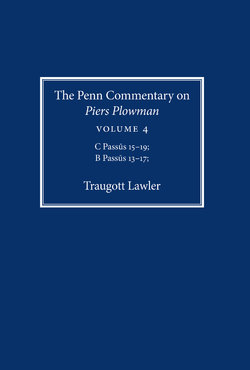Читать книгу The Penn Commentary on Piers Plowman, Volume 4 - Traugott Lawler - Страница 8
На сайте Литреса книга снята с продажи.
ОглавлениеPreface
As I have always done when annotating a text, I have assumed that what puzzles me also puzzles others; I have worked out answers to my puzzles, and then tried to write the note I’d have loved to have to guide me in the first place.
A feature of my commentary is the frequency with which I have cited Latin analogues. I have found it illuminating to use the online Patrologia Latina to deepen my understanding of what lies behind what Langland is saying; and when I have found something relevant I have passed it on. The result, I hope, will help readers see the ideas of the poem in the context of patristic and contemporary Latin culture. I have usually thought it useful to quote the Latin, but everything is translated, so that no one should feel weighed down by the Latin. A second mark of my commentary is its emphasis on comedy. My section has an unusual number of comic scenes and moments, and I have tried to bring that out without being heavy-handed about it.
I have not minded being repetitious, since readers rarely read a commentary straight through. Nor have I minded citing my own essays, most of them from YLS, since nearly all of them sprang out of my work on the commentary, and are a natural extension of it.
I am grateful to the Humanities Institute of the University of California for supporting our project at its outset, and to Yale University, especially the Koerner Center for Emeritus Faculty, for financial support on several occasions.
I have taught a graduate seminar in the poem a number of times since I started work on the commentary, and I owe a great debt to the students in those courses for helping me understand the poem. Among them, Anne Borelli, Seeta Chaganti, Christopher Cobb, Anna Keller, Nicola Masciandaro, Robert Meyer-Lee, Ray Lurie, Daniel O’Donnell, Mary Peckham, Curtis Perrin, David Rosen, Philip Rusche, George Shuffelton, Jennifer Sisk, Emily Steiner, John Watkins, and Michael Wenthe were particularly helpful. Also, after I retired Ian Cornelius often invited me to his graduate seminars, and I have been helped by his students as well, especially by a group with whom he read the poem in fall of 2014; they read parts of my draft and gave me excellent suggestions, Annie Killian and Emily Ulrich in particular. Also Ian himself read a lot of my work and responded most astutely. One more student gave me crucial help: Max Ehrenfreund. As a Yale College sophomore in 2011, Max read Chaucer, Spenser, and Donne in a course with me, and then told me he wanted to study Piers Plowman. I hired him as a research assistant, and after reading the poem with me he undertook to read my entire commentary in its then state; his sharp queries proved most valuable.
Besides Ian Cornelius, numerous of my colleagues on the Yale faculty have given me valuable help: Wayne Meeks, Harry Atkinson, and Ivan Marcus on the bible, Gene Outka on St Augustine, Denys Turner on medieval vernacular theology, Walter Cahn on medieval art, Howard Bloch on French language and literature. And I greatly miss the stimulation of my conversations about Langland and Chaucer with Lee Patterson, whose untimely death in 2012 was a blow to many of us. So were the deaths of Dorothee Metlitzki in 2001 and Fred Robinson in 2016, my longtime close friends who similarly stimulated and taught me. All through the eighties and nineties and into this century, it was an endless learning experience for me to enjoy being the colleague in the Yale English Department of these three people, and of Marie Borroff and Roberta Frank as well. And as I dwell on the past I want to call up the long-distant past and my first teachers of Langland: Father Thomas Grace, S. J. at Holy Cross College, and Morton Bloomfield at Harvard. I have dedicated my work to their memory.
I thank scholars elsewhere who answered my queries, or discussed Langlandian matters with me at conferences: Tuija Ainonen, Christopher Cannon, Christina Cervone, the late Lawrence Clopper, Andrew Cole, the late Mary Clemente Davlin, Alan Fletcher, Curtis Gruenler, Michael Kuczynski, Jill Mann, Carl Schmidt, James Simpson, M. Teresa Tavormina, Lawrence Warner, Miceal Vaughan, Christina von Nolcken, Nicholas Watson.
I thank my fellow commentators: Stephen Barney, who conceived the idea for this commentary and gathered our team, and to whom I sent first each passus as I completed it; his clearheaded guidance is evident to me on every page; Ralph Hanna, with whom this is my third collaboration, and who has been tough on me but fair; and Andrew Galloway, who joined us late but quickly outstripped us, and whose devotion to our project, and careful attention to everything I sent him, have never flagged. Anne Middleton was our intellectual leader when we started the project at Irvine in 1990. She insisted then on the highest standard, and continued to do so until she died in Fall 2016; it pains me that she who gave so much to our cause has not lived to see her own work in print. And John Alford, that fund of Langlandian knowledge, made a huge difference for all of us while he was with us. Finally, Derek Pearsall and Robert Swanson, the readers for the Penn Press, vetted my work with extraordinary care and made it far better than it was. My daughter, the writer and editor Kate Lawler, copyedited my final draft with an eagle eye.
Finally, Peggy Lawler, my wife of nearly sixty years, has teased me, justifiably, about being slow but never stopped supporting and encouraging me. Whenne alle tresores ben tried, treuthe is þe beste.
